Select Language
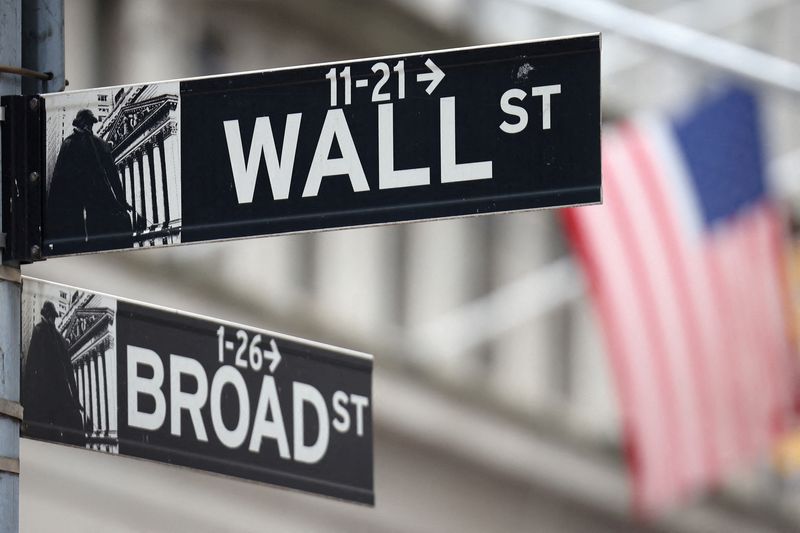
By David French
(Reuters) -The Dow Jones Industrial Average closed fractionally higher on Thursday, stretching its winning streak to five sessions despite light trading volumes and rising U.S. Treasury yields weighing on some of the dominant technology megacaps.
While the Nasdaq Composite and the S&P 500 were broadly unchanged, the indexes both finished slightly in negative territory. This snapped the Nasdaq's four-session run of higher closes, and ended the S&P 500's own run at three sessions.
On a day of few catalysts, investors responded to yields on U.S. government bonds inching higher, including the yield on the benchmark 10-year Treasury note hitting its highest since early May at 4.64% earlier in the session.
A strong auction of seven-year notes early in the afternoon though helped yields come off slightly, with the 10-year note at 4.58% in late-afternoon trade.
Higher yields are traditionally seen as negative for growth stocks, as it raises the cost of their borrowing to fund expansion. With markets increasingly dominated by the megacap technology stocks known as the Magnificent Seven, crimping their performance - especially in lieu of other market catalysts - will put downward pressure on benchmark indexes.
The S&P 500 slipped 2.45 points, or 0.04%, to 6,037.59 points, while the Nasdaq Composite lost 10.77 points, or 0.05%, to 20,020.36. The Dow Jones Industrial Average rose 28.77 points, or 0.07%, to 43,325.80.
Six of the megacaps fell, with Tesla (NASDAQ:TSLA) leading decliners with a 1.8% fall. The outlier was Apple (NASDAQ:AAPL), rising 0.3% and continuing to edge closer to becoming the first company in the world to hit a market value of $4 trillion.
The megacap tech stocks came off somewhat in the summer, as investors sought to rotate some capital into other sectors offering more value. Since the U.S. elections in November though, they have resumed their drive upwards and have outperformed the equal-weighted version of the S&P 500, said Adam Turnquist, chief technical strategist for LPL Financial (NASDAQ:LPLA).
"As a technician, what you want to see is breakouts in absolute terms and relative terms and the Mag 7 is checking the boxes there, so very constructive leadership going into the year-end," he said.
The three main indexes have hit multiple record highs this year on hopes of a lower interest rate environment and the prospects of artificial intelligence boosting corporate profits.
However, U.S. stocks have hit a speed bump in the final month of the year following an election-led rally in November as investors assess the Federal Reserve's projection of fewer interest rate cuts in 2025.
Looking ahead, LPL Financial's Turnquist said the last few weeks have seen significant reliance on the Magnificent Seven stocks driving markets higher, and we may be starting to see the cracks in this momentum. Therefore, to see further benchmark index increases, we will need to see input from other sectors of the economy.
One data release on Thursday showed the number of Americans filing new applications for jobless benefits dipped to the lowest in a month last week, consistent with a cooling but still healthy U.S. labor market.
Markets are in a seasonally strong period - called the "Santa Claus rally" - a pattern attributed to low liquidity, tax-loss harvesting and investing of year-end bonuses.
The S&P 500 has gained an average of 1.3% in the last five trading days of December and the first two days of January since 1969, according to the Stock Trader's Almanac.
Cryptocurrency-related stocks were down after Bitcoin declined 3.9%. MicroStrategy, MARA Holdings and Coinbase Global (NASDAQ:COIN) all fell between 1.9% and 4.8%.
Among the 11 S&P sectors which traded lower were consumer discretionary, off 0.6%, and the energy index, which slipped 0.1% as it tracked marginal weakness in U.S. crude prices. [O/R]
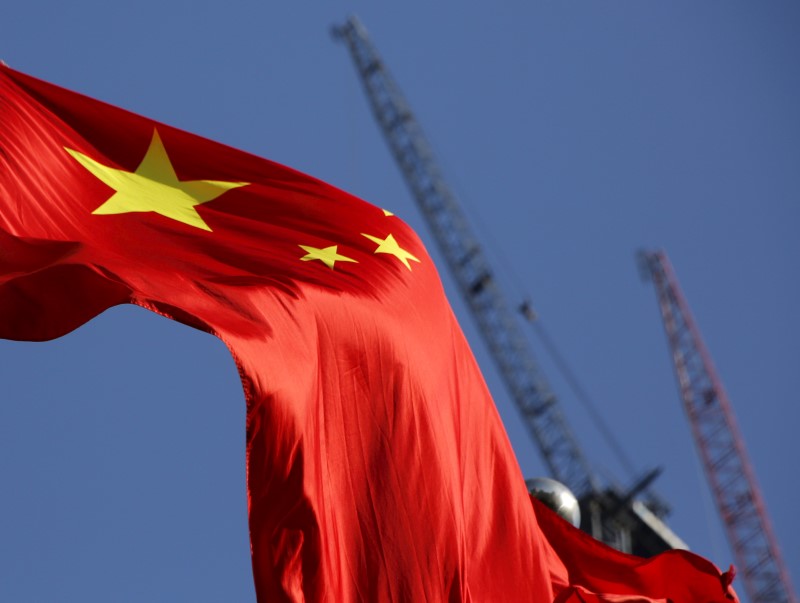
Investing.com -- The World Bank has raised its forecast for China's economic growth, projecting GDP expansion of 4.9% in 2024 and 4.5% in 2025.
The revisions, announced Thursday, reflect improved export strength and recent policy easing aimed at stabilizing the economy, including measures to support the property sector and consumer spending.
This marks a slight upward adjustment of 0.1 percentage points for 2024 and 0.4 percentage points for 2025 from the bank's previous estimates.
Despite the revised outlook, challenges persist, with the World Bank noting that weak household confidence, high local government debt, and a prolonged property downturn continue to weigh on economic activity.
"Addressing challenges in the property sector, strengthening social safety nets, and improving local government finances will be essential to unlocking a sustained recovery," Mara Warwick, the World Bank's country director for China.
China's property market, a traditional driver of growth, is unlikely to recover until late 2025, according to the bank.
Measures such as liquidity support for developers, reduced housing down payments, and state purchases of excess housing inventory have been introduced to mitigate the impact.
The bank highlighted that fiscal policy could provide an additional boost, especially if Beijing signals increased central government spending.
However, subdued domestic demand is expected to keep inflation low, with projections of 0.4% in 2024 rising to 1.1% in 2025.
"It is important to balance short-term support to growth with long-term structural reforms," Warwick emphasized, adding that clear policy communication is key to restoring confidence among consumers and markets.

Investing.com-- Most Asian currencies were lower on Thursday as the dollar remained steady near a two-year high, while the Indian rupee fell to an all-time low.
Most markets in the region were closed on Wednesday for Christmas.
The US Dollar Index was largely steady, while the US Dollar Index Futures ticked lower in Asian trade on Thursday.
Asian currencies weakened sharply last week after the Federal Reserve projected fewer rate cuts in 2025, citing concerns over sticky U.S. inflation.
Indian rupee hits record low, dollar remains near 2-yr high
The Indian rupee fell to an all-time low against the U.S. dollar, with the USD/INR pair hitting a record peak of 85.497 rupees with a 0.2% fall on Thursday. The pair had breached the 85 rupee mark last week.
The Chinese yuan’s onshore pair USD/CNY edged higher on Thursday. Chinese authorities have decided to issue a record-breaking 3 trillion yuan ($411 billion) in special treasury bonds next year, in an intensified fiscal effort to stimulate a struggling economy, Reuters reported on Tuesday.
The Singapore dollar’s USD/SGD pair rose 0.1%, while the Australian dollar’s AUD/USD pair fell 0.2%.
The South Korean won’s USD/KRW pair rose 0.4%, while the Philippine peso’s USD/PHP pair fell more than 1%, bucking the regional trend.
The U.S. dollar has shown notable strength in recent months, supported by a combination of domestic and global factors.
One key driver has been the Federal Reserve's monetary policy stance, which, despite earlier rate cuts, has shifted to maintaining higher interest rates for 2025 with projections of only two cuts.
Additionally, expectations of potential tariffs under the incoming Donald Trump administration have led to projections of higher inflation and robust economic performance, further boosting the dollar's appeal.
With expectations of the dollar remaining strong, the outlook for Asian currencies has become more clouded amid global uncertainties.
Japanese yen muted amid rate hike bets
The Japanese yen’s USD/JPY pair was largely unchanged on Thursday.
Japan's government is preparing a record $735 billion budget for the fiscal year starting in April, driven by rising social security and debt-servicing expenses, according to a draft obtained by Reuters.
BOJ Governor Kazuo Ueda said on Wednesday that the economy is expected to make progress toward sustainably reaching the central bank's 2% inflation target next year, hinting that an interest rate hike could be approaching.
The Bank of Japan ended negative interest rates in March and increased its short-term policy rate to 0.25% in July. It has indicated a willingness to raise rates further if wage and price trends align with its forecasts.
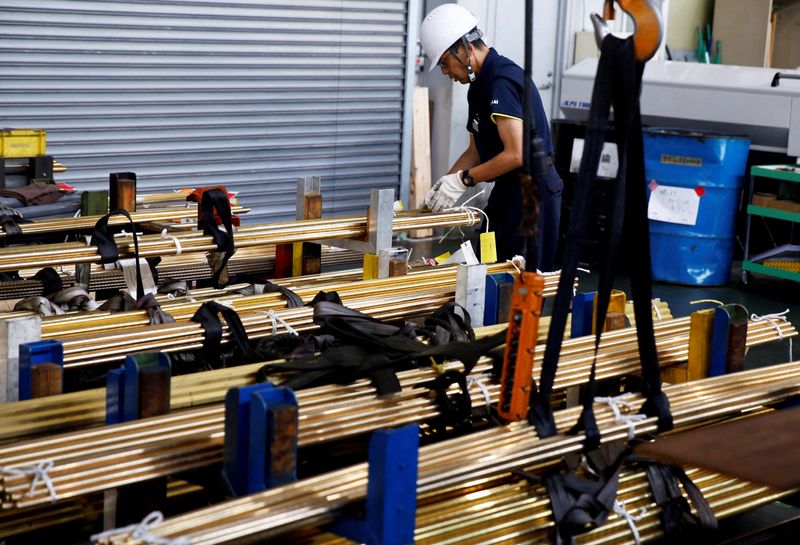
TOKYO (Reuters) - Japan's government said on Thursday it predicts economic output will recover to full capacity in the next fiscal year for the first time in seven years on an annual basis due to a tight labour market.
Japan's output gap, which measures the difference between an economy's actual and potential output, is likely to stand at +0.4% in the fiscal year starting in April, according to an estimate released by the Cabinet Office.
A positive output gap occurs when actual output exceeds the economy's full capacity, and it is considered a sign of strong demand.
With Japan's labour force at a plateau of about 69 million workers, labour shortages are likely to restrict supply, the Cabinet Office said.
Japan's output gap slipped into the negative territory in fiscal 2019, falling to as low as -4.5% in fiscal year 2020 during the pandemic.
It is among data the Bank of Japan watches closely in determining whether the economy is expanding strongly enough to propel a demand-driven rise in inflation.
The Cabinet Office expects growth in the overall consumer price index, which includes fresh food prices, to slow to 2% in the next fiscal year from 2.5% this year.
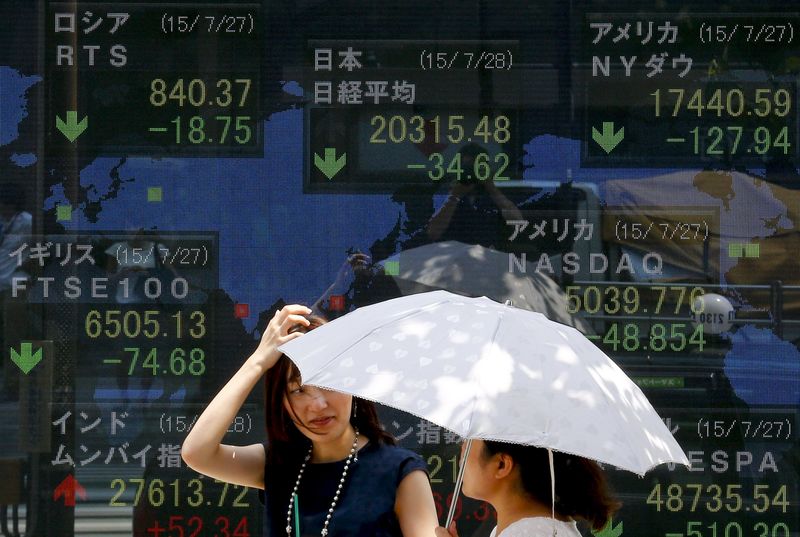
Investing.com-- Asian stocks were largely muted on Thursday as trading remained thin with major stock indexes shut for holidays, while Japanese shares climbed after a report showed Japan planning a record budget for the upcoming fiscal year.
Stock markets in Indonesia and Hong Kong were closed for Christmas, while Australia and New Zealand markets were shut on Thursday for the Boxing Day holiday.
U.S. stock index futures were largely steady in Asian trade on Thursday.
Asian markets were nursing losses in recent sessions after the Federal Reserve flagged a slower pace of interest rate cuts in 2025- a scenario that bodes poorly for risk-driven assets.
Japan shares jump on plans for record budget; firmer rate hike bets
Japan’s Nikkei 225 index rose nearly 1% on Thursday, while the TOPIX gained 0.6%.
Japan's government is preparing a record $735 billion budget for the fiscal year starting in April, driven by rising social security and debt-servicing expenses, according to a draft obtained by Reuters.
The 115.5 trillion yen draft budget comes as the Bank of Japan moves away from its decade-long stimulus program, increasing pressure on the government to take on a larger role in supporting the economy.
BOJ Governor Kazuo Ueda said on Wednesday that the economy is expected to make progress toward sustainably reaching the central bank's 2% inflation target next year, hinting that an interest rate hike could be approaching.
However, he emphasized the importance of carefully evaluating the impact of uncertainties in global economies, particularly the policies of the incoming U.S. administration under President-elect Donald Trump.
Chinese stocks muted despite fresh stimulus
China’s Shanghai Shenzhen CSI 300 and Shanghai Composite indexes were largely unchanged.
Chinese authorities have decided to issue a record-breaking 3 trillion yuan ($411 billion) in special treasury bonds next year, in an intensified fiscal effort to stimulate a struggling economy, Reuters reported on Tuesday.
Moreover, China is allowing local officials to broaden investments with key government bonds and simplifying approvals, permitting projects unless restricted by a cabinet-published list, to better utilize public funding for economic growth, a government document showed on Wednesday.
Markets were holding out for more clarity on Beijing’s plans for stimulus measures in the coming year. Recent reports suggested that the country will ramp up fiscal spending to support economic growth.
In other regions, stock markets saw marginal moves amid thin trading.
South Korea’s KOSPI was largely unchanged, while Thailand’s SET Index was also muted.
Singapore’s FTSE Straits Times Index fell 0.2%, while Nifty 50 Futures for India’s Nifty 50 index pointed to a weak open, as the index nursed steep losses over the past few weeks.
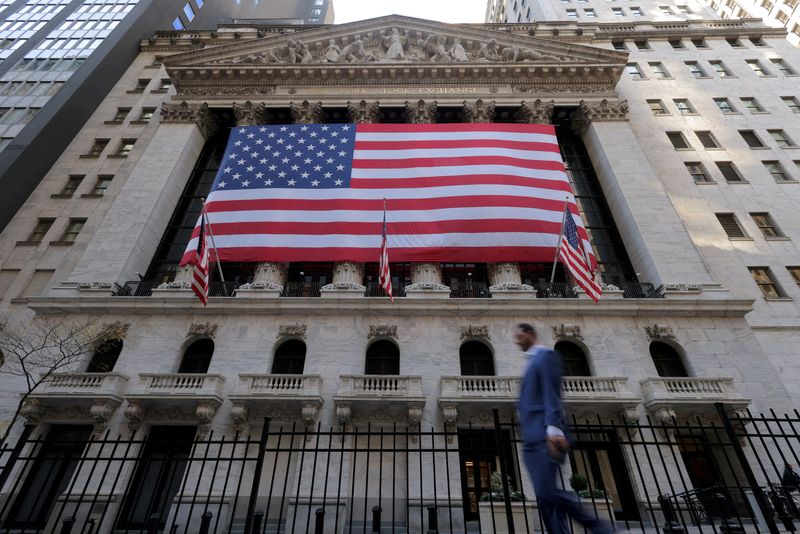
NEW YORK, Dec 24 (Reuters) - Short interest on the New York Stock Exchange rose 2.4 percent in mid-December, the exchange said on Tuesday.
As of Dec. 13, short interest rose to about 16.155 billion shares, compared with 15.784 billion shares as of Nov. 29.
Investors who sell securities short borrow shares and then sell them, expecting the stock to fall so they can buy the shares back at the lower price, return them to the lender and pocket the difference.

By Takaya Yamaguchi
TOKYO (Reuters) -Japan's government is set to compile a record $735 billion budget for the fiscal year from April due to larger social security and debt-servicing costs, adding to the industrial world's heaviest debt, a draft seen by Reuters showed.
The 115.5 trillion yen draft budget is being compiled as the Bank of Japan shifts away from its decade-long stimulus programme, putting more burden on the government to stimulate the economy.
In an attempt to improve public finances, however, the government plans to trim new bond issuance next fiscal year to 28.6 trillion yen from this fiscal year's initially planned 35.4 trillion yen, helped by tax revenue growth, the draft showed.
It is the first time in 17 years that new bond issuance will drop below 30 trillion yen.
Decades of stop-start fiscal spending and reform have left Japan with the industrial world's heaviest public debt burden - more than double the size of its annual economic output.
The BOJ's retreat from a decade of radical stimulus adds to pressure on Japan's fiscal health, as the government can no longer count on the central bank to effectively bankroll debt.
The BOJ ended negative interest rates in March and raised its short-term policy target to 0.25% in July. Governor Kazuo Ueda signalled on Wednesday that the next rate hike is nearing, saying wage and price developments indicate the economy will move closer to sustainably achieving the central bank's 2% inflation target next year.
The draft budget, up from this fiscal year's 112.6 trillion yen, is expected to be approved by Prime Minister Shigeru Ishiba's cabinet on Friday for submission to parliament for deliberation early next year.
Tax revenue is projected to rise 8.8 trillion yen from this year's initial estimate to a record 78.4 trillion yen, thanks in part to a recovery in corporate profits, according to the draft.
The primary budget balance, which excludes new bond sales and debt servicing costs, will be in deficit of less than 1 trillion yen, keeping alive the possibility of achieving the government's goal of delivering a primary budget surplus by the next fiscal year.
The budget draft assumes the yield on the benchmark 10-year government bond rises to 2% next fiscal year from this year's 1.9%, topping 2% for the first time in 13 years.
That would boost debt-servicing costs for interest payments and debt redemption to 28.2 trillion yen from 27 trillion yen for this fiscal year.
The government on Wednesday revised its economic outlook, estimating the real economic growth rate for the current fiscal year at 0.4%, down from 0.7% projected in November as a Chinese economic slowdown weighed on exports.
The growth projection for the next fiscal year was kept at 1.2%.
($1 = 157.2200 yen)
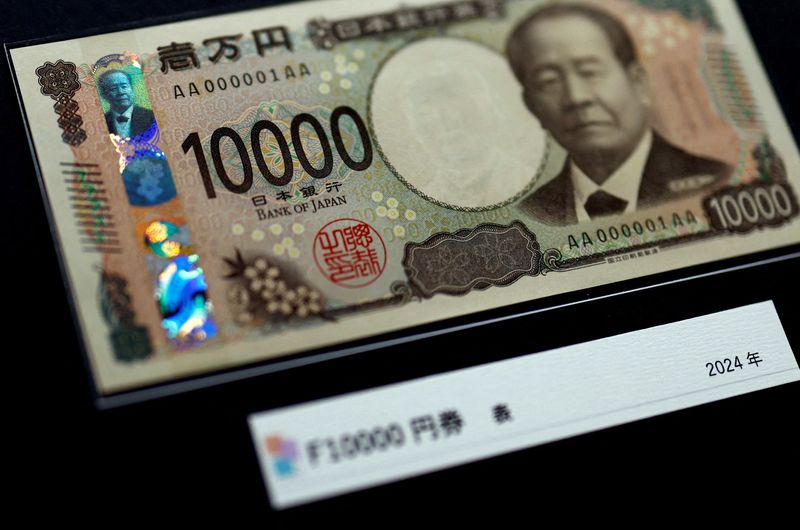
By Leika Kihara
TOKYO (Reuters) -Bank of Japan policymakers agreed in October to keep raising interest rates if the economy moves in line with their forecast, but some stressed the need for caution on uncertainty over U.S. economic policy, minutes of the meeting showed on Tuesday.
The debate highlights how overseas economic risks, particularly those surrounding the new U.S. administration's policies, will be key to how soon the BOJ will hike rates.
While the Oct. 30-31 meeting was held before Donald Trump's victory in the Nov. 5 presidential election, BOJ board members warned of renewed market volatility and potential big changes to U.S. policy as key risks to the outlook, the minutes showed.
"We can spend time scrutinising U.S. developments, including those after the U.S. presidential election, as we had already been expecting to raise rates at a moderate pace," one of the members was quoted as saying in the minutes.
Contrary to their concern over external risks, the board was mostly optimistic on domestic economic conditions. Many on the nine-member board said prospects of higher wages would support consumption and keep Japan on track to sustainably hit the BOJ's 2% inflation target, the minutes showed.
"Wage growth is likely to remain elevated in next year's spring wage negotiations" between firms and unions, a few members were quoted as saying.
The BOJ left interest rates steady at 0.25% at the October meeting but projected inflation to move around its 2% target in the coming years, signalling that it was on track to hike borrowing costs in the near-term horizon.
While the board confirmed the view the BOJ would continue to raise rates if its economic and price projections were met, many called for vigilance to various risks, the minutes showed.
"We must guide monetary policy cautiously given heightening uncertainty at home and abroad," one member was quoted as saying in explaining why the BOJ should stand pat in October.
"The BOJ must spend time and be cautious" in deciding when to raise rates as Japan has not seen its policy rate exceed 0.5% for the past three decades, another opinion showed.
The BOJ kept rates unchanged at a subsequent meeting in December to await more data on whether wages would retain their upward momentum next year, and to gain more clarity on U.S. president-elect Donald Trump's policies.
The BOJ ended negative interest rates in March and raised its short-term policy target to 0.25% in July. It has signalled a readiness to hike again if wages and prices move as projected.
All respondents in a Reuters poll taken earlier this month expected the BOJ to raise rates to 0.50% by end-March, although they had been divided on whether the move would come in December, January or March.

(Reuters) - Chinese authorities have agreed to issue 3 trillion yuan ($411 billion) worth of special treasury bonds next year, two sources said, which would be the highest on record, as Beijing ramps up fiscal stimulus to revive a faltering economy.
The plan for 2025 sovereign debt issuance would be a sharp increase from this year's 1 trillion yuan and comes as Beijing prepares to soften the blow from of an expected increase in U.S. tariffs on Chinese imports when Donald Trump returns to the White House in January.
The proceeds will be targeted at boosting consumption via subsidy programmes, equipment upgrades by businesses and funding investments in innovation-driven advanced sectors, among other initiatives, said the sources.
The sources, who have knowledge of the discussions, declined to be named due to sensitivity of the matter.
The State Council Information Office, which handles media queries on behalf of the government, the finance ministry and the National Development and Reform Commission (NDRC), did not immediately respond to a Reuters request for comment.
The planned special treasury bond issuance next year would be the largest on record and underscores Beijing's willingness to go even deeper into debt to counter deflationary forces in the world's second-largest economy.
China does not generally include ultra-long special bonds in its annual budget plans, as it sees the instrument as an extraordinary measure to raise proceeds for specific projects or policy goals as needed.
As part of next year's plan, about 1.3 trillion yuan to be raised through long-term special treasury bonds would fund "two major" and "two new" programmes, said the sources with knowledge of the matter.
The "new" initiatives consist of a subsidy programme for durable goods, where consumers can trade in old cars or appliances and buy new ones at a discount, and a separate one that subsidises large-scale equipment upgrades for businesses.
The "major" programmes refer to projects that implement national strategies such as construction of railways, airports and farmland and build security capacity in key areas, according to official documents.
The state planner NDRC said on Dec. 13 Beijing had fully allocated all proceeds from this year's 1 trillion yuan in ultra-long special treasury bonds, with about 70% of proceeds financing the "two major" projects and the remainder going towards the "two new" schemes.
TARIFFS THREAT
Another big portion of the planned proceeds for next year would be for investments in "new productive forces", Beijing's shorthand for advanced manufacturing, such as electric vehicles, robotics, semiconductors and green energy, the sources said.
One of the sources said the amount earmarked for that initiative would be more than 1 trillion yuan.
The remaining proceeds would be used to recapitalise large state banks, said the sources, as top lenders struggle with shrinking margins, faltering profits and rising bad loans.
The issuance of new special treasury debt next year would equate to 2.4% of the country's 2023 gross domestic product (GDP). Beijing had raised 1.55 trillion yuan via such bonds in 2007, or 5.7% of the country's economic output at that time.
President Xi Jinping and other top officials met at the annual Central Economic Work Conference (CEWC) on Dec. 11-12 to chart the economic course for 2025.
A state media summary of that meeting said it was "necessary to maintain steady economic growth", raise the fiscal deficit ratio and issue more government debt next year, but did not mention specific numbers.
Reuters reported last week, citing sources, that China plans to raise the budget deficit to a record 4% of GDP next year and maintain an economic growth target of around 5%.
At the CEWC, Beijing sets targets for economic growth, the budget deficit, debt issuance and other goals for the year ahead. These targets, usually agreed upon by top officials at the meeting, will not be officially announced until an annual parliament meeting in March and could still change before then.
China's economy has struggled this year due to a severe property crisis, high local government debt and weak consumer demand. Exports, one of the few bright spots, could soon face U.S. tariffs in excess of 60% if Trump delivers on his campaign pledges.
While the risks to exports mean China will need to rely on domestic sources of growth, consumers are feeling less wealthy due to falling property prices and minimal social welfare. Weak household demand also poses a key risk.
Last week, Chinese officials said that Beijing plans to expand the consumer goods and industrial equipment trade-in programmes to include more products and sectors.
($1 = 7.2939 Chinese yuan)
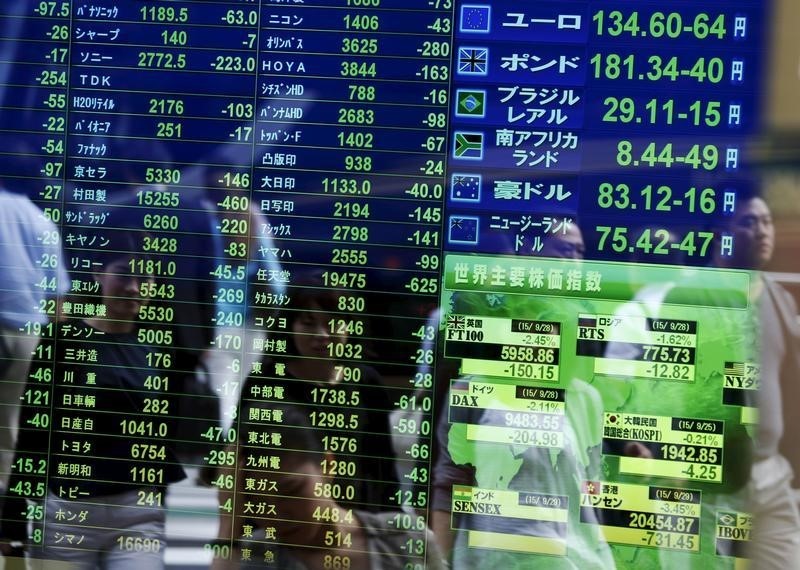
Investing.com-- Most Asian stocks rose on Tuesday, supported by gains in technology stocks as they tracked their U.S. peers, although trading volumes were slim before the Christmas break.
Regional markets took positive cues from Wall Street, which closed higher on Monday as technology stocks recouped some of their steep losses from last week. U.S. stock index futures were flat in Asian trade.
Wall Street will have a shortened trading session on Tuesday, as will most Asian markets.
Asian markets were nursing losses in recent sessions after the Federal Reserve flagged a slower pace of interest rate cuts in 2025- a scenario that bodes poorly for risk-driven assets.
Japan shares muted; Honda rallies, Nissan flat amid merged talk
Japan’s Nikkei 225 index fell slightly on Tuesday, as did the TOPIX.
Focus was squarely on automakers Honda (NYSE:HMC) Motor Co Ltd (TYO:7267) and Nissan Motor Co., Ltd. (TYO:7201), after they confirmed on Monday that they were in talks over a potential merger, which will be completed in 2026.
Honda’s shares rallied as much as 15%, also benefiting from the company announcing a 1.1 trillion yen ($7 billion) buyback.
Nissan (OTC:NSANY), on the other hand, traded flat after recouping a bulk of losses clocked earlier in the session. The stock had risen sharply on Monday after news of the merger first broke.
Mitsubishi Motors (OTC:MMTOF), in which Nissan holds a 34% stake- will also consider joining the merger. Its shares rose 3.6%.
The Honda-Nissan deal will create the world’s third-largest automaker by sales once completed. But analysts noted that a 2026 date for the deal was too cautious, especially given that the automakers were grappling with an extended decline in sales.
Chinese stocks upbeat on stimulus hopes
China’s Shanghai Shenzhen CSI 300 and Shanghai Composite indexes rose around 0.7% each, while gains in tech stocks saw Hong Kong’s Hang Seng index rally 1%.
Markets were holding out for more clarity on Beijing’s plans for stimulus measures in the coming year. Recent reports suggested that the country will ramp up fiscal spending to support economic growth.
Optimism over more stimulus helped Chinese stocks weather a recent downturn in Asian markets. Chinese purchasing managers index data is now due in the coming days and is set to offer more cues on Asia’s largest economy.
Broader Asian stocks were mostly higher in shortened holiday trading. Australia’s ASX 200 added 0.1% as the minutes of the Reserve Bank’s December meeting showed policymakers signaling an eventual decline in interest rates.
South Korea’s KOSPI fell 0.2%, as gains in tech stocks were offset by persistent concerns over political turmoil in the country.
Singapore’s Straits Times Index index rose 0.5%, while futures for India’s Nifty 50 index pointed to a weak open, as the index nursed steep losses over the past few weeks.

